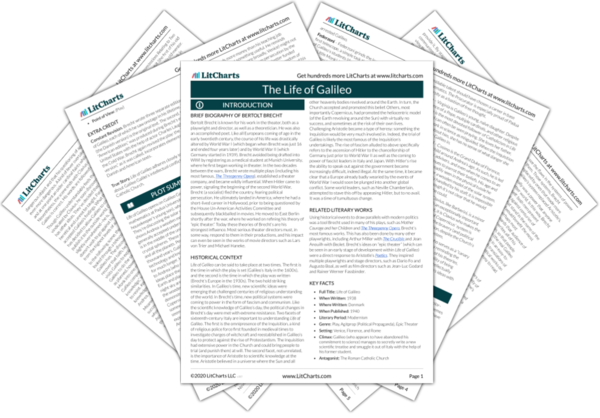Brecht’s Galileo is a genius who wants nothing more than to keep his eyes firmly trained on the night sky, looking for answers to large-scale questions about existence and thinking about the way the universe works. He sees this labor as his true calling. Yet, as astronomy isn’t a well-paid profession in Galileo’s time, he finds himself constantly torn between his passion and the banal requirements of day-to-day life, like making money to pay for food. Such considerations tie Galileo down, rob him of energy and time, and ultimately limit his potential. Throughout the play, Brecht presents moments that seem to prompt the audience to ask themselves what would have happened if Galileo had been left to his own devices and allowed to work as he pleased. In turn, this becomes a strong indictment of the money’s importance in our lives. It’s obvious that the Galileo of Brecht’s play did not achieve his full potential because he had to perform mindless work and face equally mindless persecution. In that light, Brecht’s play becomes a polemic against working for money (another facet in his subtle advocating for socialism) because such work stifles progress for all of humanity.
To make ends meet, Galileo must hold three jobs: one as a lecturer at Padua University, one as a private tutor, and the last as an inventor. Each robs him of time. The first job, as a lecturer, seems the most likely to do service to humanity. After all, it allows Galileo to disseminate his ideas to future generations, who can use them and build on them. It also absorbs the least amount of his time: four hours each week in lecture, plus preparation. However, as the Procurator points out, Galileo’s lectures do little to bring in new students, despite his fame, because mathematics will not be a profitable career for them. And, what’s more, Galileo doesn’t actually get to disseminate his own ideas to his students. He has to teach from approved doctrine, hammering in Aristotle, despite that he knows Aristotle to be wrong. Thus, his teaching job is not contributing to the progress of humanity.
While his work tutoring private students might offer an opportunity for him to undo this harm, it comes with its own set of problems. Only particularly well-off students, like Ludovico, can afford to be tutored by Galileo. Yet Ludovico has no real passion for the sciences. He’s only dabbling in them to appease his mother until he can take over the family estate and concern himself solely with his horses. Good students who could build on Galileo’s teachings in the future (students like Andrea) instead get bumped from Galileo’s tutelage because they can’t afford to pay. Furthermore, as Galileo tells the Procurator, the number of private students he has to take on to make up for his poor university wages taxes his time incredibly. “I teach and I teach,” Galileo pleads, “and when am I supposed to learn?”
His third job, as an inventor, is not quite as cut and dry. Galileo’s inventions do help humanity to progress while making him money. He invents a proportional compass, for instance, that allows even the mathematically disinclined to perform complex calculations with relative ease. It’s used in banking for tasks like figuring compound interest, and in military endeavors for calculating the weight and trajectory of cannon balls. He also invents a water pump and irrigation system for Venice that help many people. This is not only useful work, but it’s also work that Galileo claims to enjoy; however, it’s also “kids’ stuff” to him. It neither asks important questions nor helps to solve them. Instead, such work takes up Galileo’s time when it could (at least in his mind) be completed by someone of lesser genius. Thus, while inventing does advance humanity, it does so to a far lesser degree than the work Galileo would do if he weren’t so busy. Brecht explains the tragedy of this in the poetic opening of the thirteenth scene, remarking that the day Galileo recanted his doctrine might have instead represented the dawning of a new age of reason had Galileo been able to devote himself fully to his passion.
Work vs. Passion ThemeTracker

Work vs. Passion Quotes in The Life of Galileo
God help us, I'm not half as sharp as those gentlemen in the philosophy department. I'm stupid. I understand absolutely nothing. So I'm compelled to fill the gaps in my knowledge. And when am I supposed to do that? When am I to get on with my research?
Today a world-famous scholar is offering you, and you alone, a highly marketable tube, for you to manufacture and sell as and how you wish.
You were hiding the truth. From the enemy. Even in matters of ethics you were centuries ahead of us.











